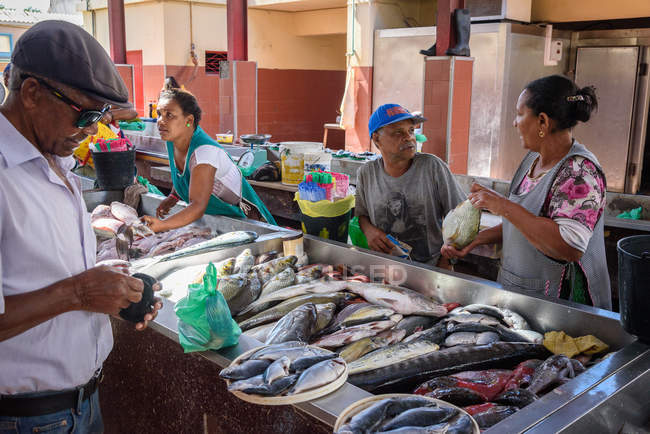Women-Led Fish Trade Gains Formal Financing Gateway
Public-utility status formalizes Mindelo’s fish trade; euro-peg stability (EURUSD=X) and benign energy costs (CL=F) support margins while frontier risk tone (EMB, FM) frames external funding conditions for small sovereigns.

Cabo Verde has granted public-utility status to the Mindelo Fish Sellers’ Association, formalising a women-led retail network central to fish distribution in São Vicente. The October 2025 designation gives the cooperative legal standing to contract services, open accounts, and receive targeted technical assistance for cold-chain and hygiene standards. It is a regulatory intervention rather than a spending programme, suited to a high-debt small-island economy prioritising formalisation, data visibility, and food-safety compliance over budgetary outlays.
The mechanism channels support through a single intermediary instead of atomised micro-grants. Public-utility status creates an auditable spine for inspections, traceability, and digital payments, and enables pooled procurement of ice, packaging, and transport. Pooled purchasing compresses unit costs and reduces post-harvest losses, the main efficiency wedge in artisanal fisheries. Because the measure relies on legal recognition rather than subsidies, it shifts execution risk to governance and logistics rather than the budget, aligning with a macro stance constrained by debt and reliant on rule-based anchors.
Macro conditions support transmission. Headline inflation eased into a 2–3% year-on-year range through Q3 2025 from higher rates in 2023, while the euro-pegged escudo maintained price stability for low-margin retail segments; the EURUSD=X proxy captures the peg’s external anchor. Foreign-exchange reserves were broadly stable around 6–7 months of import cover in mid-2025, consistent with peg credibility and a cautious monetary stance.
With consumer prices contained and the exchange rate anchored, real purchasing power in low-income markets improves, raising the probability that formalised retail margins can service cooperative loans without price shocks. Domestic rates co-move with euro-area conditions but pass-through is moderated by local liquidity and bank balance-sheet constraints.
The fisheries chain is economically material even at modest scale. On pre-pandemic benchmarks, fisheries contributed roughly 3–4% of GDP and a significant share of goods exports, while tourism remained the dominant source of external receipts. Post-pandemic normalisation has been gradual. Public debt stood elevated in 2024, commonly cited around 110–115% of GDP, and the fiscal deficit remained in low single digits of GDP, reflecting interest costs and capital execution. In this context, formalisation functions as a fiscal instrument: migrating cash transactions onto cooperative ledgers and e-payments enlarges the tax base via compliance rather than rate increases and improves data for supply-chain oversight.
Market read-through is governance-based, not index-moving. Global risk proxies—CL=F for oil and ETFs such as EMB and FM—frame the external backdrop for frontier issuers. Oil prices influence imported-inflation pass-through and logistics margins, while frontier credit beta tightened modestly in 2025 alongside disinflation in several peers, a tailwind for small sovereigns with credible anchors. Cabo Verde’s peg and reserve position reduce volatility; investors interpret formalisation as institutional depth, not fiscal expansion.
The causal chain is explicit: recognition compresses transaction frictions; pooled logistics and inspections reduce waste; digital payments raise traceability; higher traceability expands the compliance net; the broader compliance net strengthens medium-term revenue without immediate deficit impact. The growth effect is incremental but durable if execution holds. The principal bottlenecks are cold-chain reliability, inspection cadence, and cooperative governance. A supply-side shock in fuel or packaging would narrow margins and slow adoption; a tightening of euro-area financial conditions would raise local borrowing costs via the peg channel.
Forward indicators are measurable and time-anchored. By end-2026, success entails: digital-payment adoption across at least 50% of registered traders within the cooperative; a measured reduction of post-harvest loss rates by at least 2 percentage points in Mindelo’s municipal markets; cooperative-level credit disbursements accessing at least 10% of registered members; and maintenance of headline inflation at or below a 3% annual average with reserves above six months of imports. Meeting these thresholds would confirm that public-utility status has converted an essential informal network into a scalable, financeable node of the blue-economy strategy, improving fiscal traction without widening the deficit and reinforcing Cabo Verde’s reputation for low-cost, institution-first reform.





